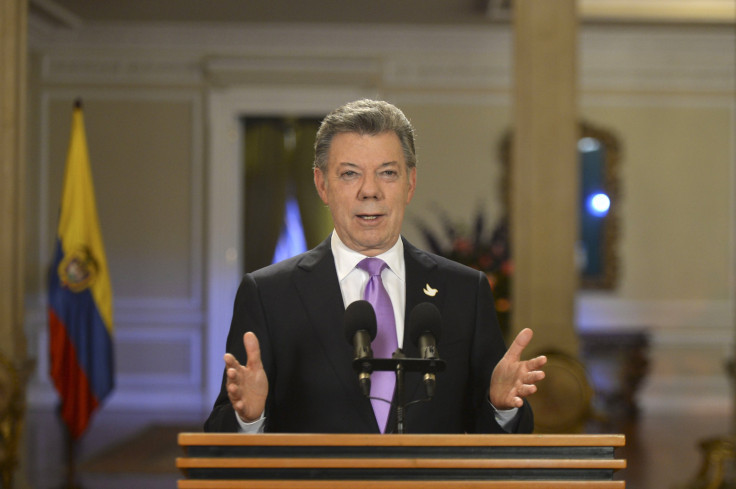
Colombia will cease aerial raids of FARC rebel bases for 30 days, President Juan Manuel Santos announced on Thursday from Bogotá. Colombia’s unilateral ceasefire is the latest milestone in peace talks being held in Cuba with FARC leadership. The announcement follows significant commitments from the FARC including cooperation in demining battlefields, cessation of child soldier recruitment, and a unilateral ceasefire that’s almost entirely halted anti-government military attacks.
“I have decided to give the order to the Minister of Defense and to the commanders of the Armed Forces to cease bombings for one month. At the end of this period we will have an evaluation and in accordance with the results it will be decided if the measure will be maintained,” Santos said, quoted by the DPA and ANSA news agencies.
It’s far from a peace agreement, but the simultaneous bilateral ceasefires may be setting up Colombia for what Santos calls the “definitive phase” of a peace deal. He’s so confident in the success of the talks that he’s requested that congress approve a Post-Conflict Council to oversee the transition to peace.
Santos’ opposition, however, aren’t as hopeful. Many see his cessation of bombing raids as a military advantage for the FARC. That’s because the FARC used past ceasefires to regroup, rearm, and prepare for more attacks against Colombia troops. Alfredo Rangel, of the Centro Democratico (ex-president Uribe’s center-right party) told Noticias RCN that relieving pressure on the FARC increase organized crime and the resulting revenue.
“What Santos is doing is clearing the country militarily so that there’s more freedom for guerillas to commit crime,” said Rangel. “Now they’re going to increase incidents of extortion, racketeering, drug-running and recruitment. This will allow the guerillas to rearm and reorganize.”
However, many analysts remain optimistic. With both the government and the FARC invested in winning over the public, the unilateral ceasefires create a sense of shared responsibility, as Leonardo Goi, researcher for the Bogotá-based Fundación Ideas Para la Paz, explains in a recent piece for Latin dispatch. For Santos, its a way of saying “the ball is in your court.”
“By implementing a unilateral ceasefire and making it dependent on the government’s avoiding any attack against the guerrillas, the FARC had effectively made Santos’ administration co-responsible for a possible breakdown of the truce, and the consequent crisis the peace talks would have suffered. By calling for a temporary halt to the hostilities of the armed forces, Santos has now shifted the burden back.”
For existing opposition, concessions to the FARC appear to be a sign of weakness. And unlike the FARC -- who are sick of fighting -- opposition parties might be even harder to court than left-wing Marxist rebels.
“Somewhat paradoxically, establishing a dialogue with Uribe’s ranks may be harder for Santos than reaching a deal in Cuba,” Goi wrote.
© 2025 Latin Times. All rights reserved. Do not reproduce without permission.




